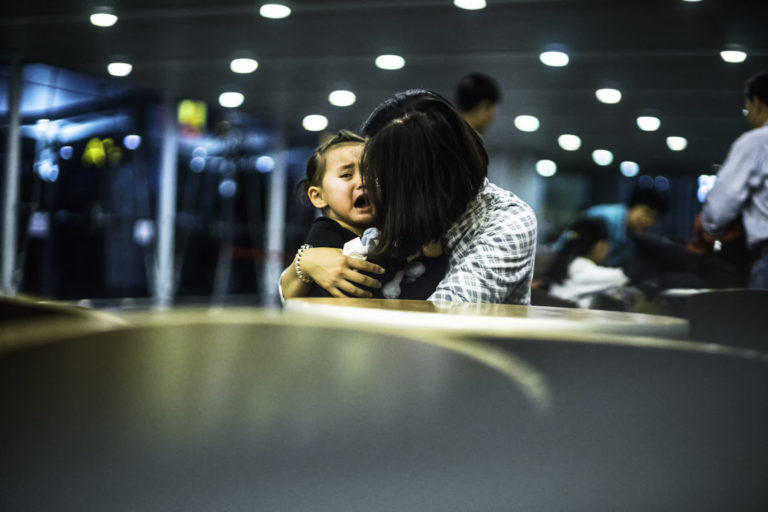
A woman looks for seashells on Copacabana Beach on October 12, 2014 in Rio de Janeiro, Brazil. Image by Mario Tama.
The Symmetry of Imperfection
I collect imperfect things. Seashells, mostly.
There is a symmetry in their imperfection that appeals to me. The shells are mostly what I have found along New England beaches: toe nail shells, mussels, Atlantic bay scallop, quahogs, razor clams, ribbed top shells, channeled whelk. Some are peppered with barnacles. Others thickened with layers of sea detritus attaching over time. Some have been smoothed by weather to the point of silkiness and left with a luster that is pearl-like — revealing color when light strikes them. Some shells are broken, some are whole. And some barely have an outline left to remind you of what they once were.
I keep them all because they remind me that I am imperfect and that is okay. My imperfections have helped me become someone I like. Out of my flaws has come a person able to face her mistakes instead of hovering in the shadows trying to forget she ever made them.
I know my father is turning over in his grave right now as I write this. Perfection was his God.
He always believed perfection was attainable and hungered for it his whole life; he would accept nothing less. So I grew up believing I had to be something I could never be. Out of this mess, I eventually learned that imperfection was really everyone’s lot in life and that if I was ever going to become a healthy person emotionally, I had to learn to forgive myself and others for their imperfections.
This was not easy. While in theory, I have always believed in forgiveness — years of religious education and my mother’s admonitions have seen to that — real life has been another story. In the past, when someone wronged me, I didn’t stick around to wonder why he or she did what they did or what role, if any, I may have played in the whole affair — I cut my losses and walked away. No fights, no recriminations; I just shelved the pain and moved on, cutting that person out of my life entirely.
While this approach gave me the quiet life I wanted, I’ve lost some important relationships along the way. Relationships I wonder about now. Could the rift have been repaired?
Though we are all taught to forgive, it’s not always so easy to do. Most of us want our pound of flesh. We want to see that the other person has suffered as much as we have before we forgive; we want to know they are sorry for what they did. But what happens when they aren’t sorry? Or they haven’t suffered?
That’s the first rub because forgiveness can never be about what the other person thinks or feels or even wants. It’s about not letting the feelings you harbor control your life.
And here’s the second rub, even if you are able to forgive, it doesn’t automatically bring peace. At any moment the old pain can and often does return — as powerful in its intensity as the day it happened. Yet, if you have forgiven someone, you are required to face this pain and then let it go. That doesn’t come easily to most of us.
Often, it seems, the path to forgiveness is a long journey. It may take years before you’re even ready to say the words. Sometimes it requires you to live your life until you’ve accidentally stepped into the shoes of the person who has wronged you. Forgiving our parents, it seems to me, often falls into this category.
For much of my adulthood I saw my father through the eyes of a frightened child. That he died when I was in my twenties didn’t change a thing. He still loomed large in my life and his strict Edwardian ways haunted my every step. Only when I became a parent myself did things begin to change.
Little light bulbs started going off in my head as I watched myself struggle year after year against becoming my father. To stem that tide of shock, I tried to understand why I was choosing to act the way I did. And that invariably led me to ask why my father had chosen to behave the way he had. These questions, in turn, led me to my mother, who began telling me things about my father I hadn’t known before. I gradually stopped seeing my father through the eyes of that child and began to see him as the complicated individual he was. My new understanding didn’t alter the things that he had done or the cruelty behind them, but it did bring a deep desire to let go of the anger that had dogged me my entire life.
Add to this puzzle my son and we come full circle; for it was my son who taught me how to forgive. No matter how many mistakes I made as he was growing up, my son always gave me another chance. Eventually, his compassion rubbed off on me and I found my heart opening to my father.
We are not perfect. Our lives are a jumble of the good, the bad, and the ugly. We make mistakes; sometimes huge mistakes that seem unforgivable. Yet, if we can learn to forgive ourselves and if others can forgive us, it can begin a whole new chain of events.

Share your reflection